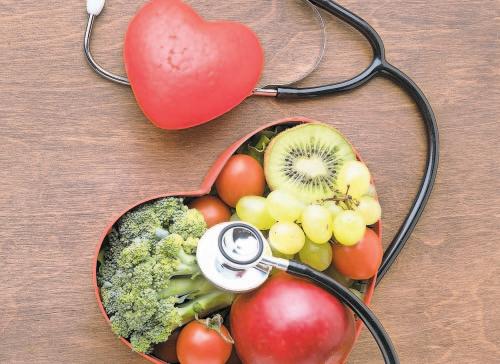
3 minute read
Keep your ticker ticking


Focus on being heart smart
There are some things you just can’t live without and your heart is one of them. Taking small steps to improve your heart health each day can result in big payoffs for your overall vitality.
Some people manage to overhaul their exercise pattern, diet, and unhealthy habits with ease. The rest of us try to make changes, but don’t always succeed. Instead of undertaking a huge makeover, you might be able to improve your heart’s health with a series of small changes. Once you get going, you may find that change isn’t so hard. This approach may take longer, but it could also motivate you to make some big changes.
Start simple on the road to better health. These steps can help you reduce your risk for heart disease.
Stop the stress
It’s often easier said than done, but making a conscious effort to stress less can do wonders for your heart. Prolonged stress can increase blood pressure, which can damage artery walls, and also lead to a higher occurrence of self-medicating behaviors like smoking and drinking alcohol. Try meditation, taking a yoga class, going on a leisurely walk, or enjoying a long, relaxing bath to help keep your stress level in check for better heart health.

Commit to cardio
You’ve heard it before, but it’s true that regular exercise can help thwart heart disease. The American Heart Association recommends at least 150 minutes of moderate exercise per week or 75 minutes of vigorous exercise per week. When your busy schedule gets in the way, try working other simple cardio activities into your daily routine.


Take the stairs instead of the elevator or park in a distant parking spot at work so you have to walk farther to the building. These little bits of exercise throughout the day can add up and help build a healthy heart!


Halt the salt

Salt is a major contributor when it comes to high blood pressure, heart disease, and stroke. According to the Centers for Disease Control and Prevention, an astonishing 90 percent of Americans eat too much sodium, with the average person consuming more than 3,000 mg of sodium per day.
Be mindful of your daily sodium intake, and aim to keep the amount below 1,500 mg per day. Pay close attention to food labels, and steer clear of processed foods, bread, cold cuts, cured meats just to name a few top sources of sodium as much as possible.

Shelve the sugar


Like salt, sugar consumption is another major risk factor when it comes to endangering heart health. Eating too much sugar can lead to weight gain and also diabetes, which both increase the chances of developing heart disease. Shop for foods with labels indicating there is no added sugar, and choose unsweetened items whenever possible.

Be sure to avoid those tempting sugarpacked beverages sodas, sports drinks, energy drinks, and even flavored water. When your sweet tooth gets the best of you, consider a healthy serving of fruit, such as blueberries or raspberries, which have lower sugar content compared to other fruits.
Know your numbers and family history
Schedule routine check-ups with your doctor to measure your blood pressure, cholesterol and glucose levels, so that together, you can evaluate your current health profile and make adjustments as needed. Knowing your numbers can help you make lifestyle modifications.
And if you haven’t done so already, learn you family health history. Understand the conditions and diseases within your family and in partnership with your doctor, use this knowledge to proactively manage your wellbeing and your heart health.
Learn heart attack and stroke danger signs
Heart attack and stroke are serious, lifethreatening emergencies. It’s important to learn the signs, and if necessary, act without delay. More recently, there has been a focus on increasing awareness about how women may exhibit different heart attack symptoms than men. Similar to men, the most common heart attack symptom among women is some type of pain, pressure or discomfort in the chest.
Some symptoms are more likely to be experienced by women than men, including shortness of breath; back or jaw pain; and nausea or vomiting. The good news? There are now tests available that may help more accurately diagnose heart attacks among women – especially compared to standard blood tests.


Be social




Carve out a couple of hours to get together with friends regularly and your body and mind will thank you. People with many social ties tend to have lower blood pressure, they’re less likely to smoke and they’re more likely to be physically active.
You only have one heart, so taking care of it must be a top priority.
Photo: What does it take to have a healthy heart? A lot depends on you, and your risk factors. If you imagine that healthy living means a bland diet and hours at the gym, you might be surprised to learn how simple, everyday choices can make a big difference.







